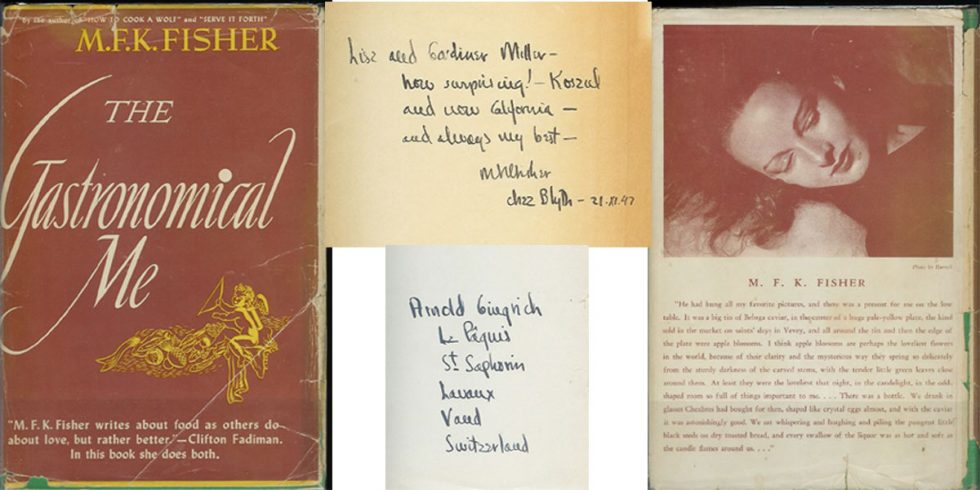
Food writing is not confined to food writers. After all, food concerns us all and we all have something to say about it. Some use it as metaphor, others as porn. Here are a few examples from classic literature.
Food as the Essence of Being Human: M.F.K. Fisher
Fisher went straight to the point. Food was intertwined in almost all she wrote and used as a metaphor for the need for love in life. It was inescapable connected with its opposite, hunger.
“It seems to me that our three basic needs, for food and security and love, are so mixed and mingled and entwined that we cannot straightly think of one without the others. So it happens that when I write of hunger, I am really writing about love and the hunger for it, and warmth and the love of it and the hunger for it… and then the warmth and richness and fine reality of hunger satisfied… and it is all one.”
M.F.K. Fisher, The Art of Eating: 50th Anniversary Edition
Food, Heaven and Hell: Barbara Kingsolver
“Tortolita, let me tell you a story,” Estevan said. “This is a South American, wild Indian story about heaven and hell.” Mrs. Parsons made a prudish face, and Estevan went on. “If you go visit hell, you will see a room like this kitchen. There is a pot of delicious stew on the table, with the most delicate aroma you can imagine. All around, people sit, like us. Only they are dying of starvation. They are jibbering and jabbering,” he looked extra hard at Mrs. Parsons, “but they cannot get a bit of this wonderful stew God has made for them. Now, why is that?”
“Because they’re choking? For all eternity?” Lou Ann asked. Hell, for Lou Ann, would naturally be a place filled with sharp objects and small round foods.
“No,” he said. “Good guess, but no. They are starving because they only have spoons with very long handles. As long as that.” He pointed to the mop, which I had forgotten to put away. “With these ridiculous, terrible spoons, the people in hell can reach into the pot but they cannot put the food in their mouths. Oh, how hungry they are! Oh, how they swear and curse each other!” he said, looking again at Virgie. He was enjoying this.
“Now,” he went on, “you can go and visit heaven. What? You see a room just like the first one, the same table, the same pot of stew, the same spoons as long as a sponge mop. But these people are all happy and fat.”
“Real fat, or do you mean just well-fed?” Lou Ann asked.
“Just well-fed,” he said. “Perfectly, magnificently well-fed, and very happy. Why do you think?”
He pinched up a chunk of pineapple in his chopsticks, neat as you please, and reached all the way across the table to offer it to Turtle. She took it like a newborn bird.”
Barbara Kingsolver, The Bean Trees
Food and Nature: Ernest Hemingway
“As I ate the oysters with their strong taste of the sea and their faint metallic taste that the cold white wine washed away, leaving only the sea taste and the succulent texture, and as I drank their cold liquid from each shell and washed it down with the crisp taste of the wine, I lost the empty feeling and began to be happy and to make plans.”
Ernest Hemingway, A Moveable Feast
Food Porn: Mark Twain
“A mighty porterhouse steak an inch and a half thick, hot and sputtering from the griddle; dusted with fragrant pepper; enriched with little melting bits of butter of the most impeachable freshness and genuineness; the precious juices of the meat trickling out and joining the gravy, archipelagoed with mushrooms; a township or two of tender, yellowish fat gracing an out-lying district of this ample county of beefsteak; the long white bone which divides the sirloin from the tenderloin still in its place.”
Food and Connectedness: Wendell Berry
“Eating with the fullest pleasure — pleasure, that is, that does not depend on ignorance — is perhaps the profoundest enactment of our connection with the world. In this pleasure we experience our dependence and our gratitude, for we are living in a mystery, from creatures we did not make and powers we cannot comprehend.”
Food and the Elements: James Joyce
Mr Leopold Bloom ate with relish the inner organs of beasts and fowls. He liked thick giblet soup, nutty gizzards, a stuffed roast heart, liverslices fried with crustcrumbs, fried hencods’ roes. Most of all he liked grilled mutton kidneys which gave to his palate a fine tang of faintly scented urine.”
Food and Comfort: Mark Twain
“I know the look of an apple that is roasting and sizzling on the hearth on a winter’s evening, and I know the comfort that comes of eating it hot, along with some sugar and a drench of cream… I know how the nuts taken in conjunction with winter apples, cider, and doughnuts, make old people’s tales and old jokes sound fresh and crisp and enchanting.”
Food and Childhood Nostalgia: C. S. Lewis
“The Queen let another drop fall from her bottle on to the snow and instantly there appeared a round box, tied with green silk ribbon, which, when opened turned out to contain several pounds of the best Turkish Delight. Each piece was sweet and light to the very center and Edmond and never tasted anything more delicious.”
Food and Childhood Nostalgia: Charles Dickens
“As I looked along the yellow expanse out of which I remember its seeming to grow, like a black fungus, I saw speckled-legged spiders with blotchy bodies running home to it, and running out from it . . . ‘I can’t guess what it is, ma’am.’ ‘It’s a great cake. A bride-cake. Mine!’”
Food and Philosophy: Miguel de Cervantes
|
|




















